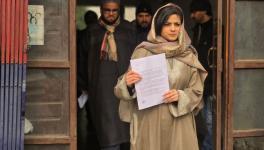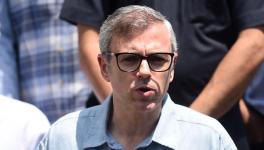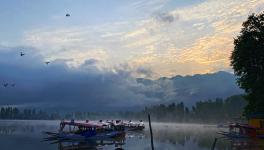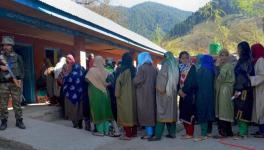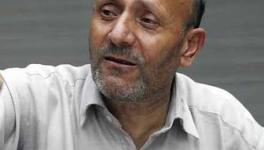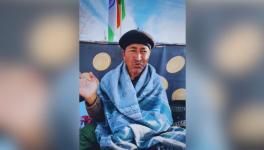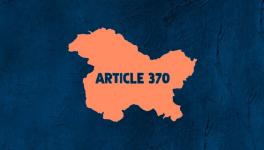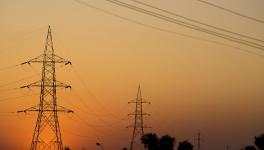Sajad Lone-led JKPC: A 'Defining Political Force' in Kashmir or a 'Party in Fragments'?
Srinagar: The Jammu and Kashmir People’s Conference (JKPC), led by former separatist Sajad Lone, is emerging as a new political front in the region after the party welcomed three new leaders into its fold on Monday, including a former minister.
“It is a matter of satisfaction that the Peoples Conference is emerging as a strong political force in J&K. I will work alongside the party’s rank and file in ensuring that the party’s flag flies high across all regions of J&K,” Lone said as he welcomed the new members.
Sceptics, however, claim the party’s journey to become a strong political force amidst political upheaval in the newly-formed Union territory faces several challenges.
Over a dozen leaders and political workers have joined JKPC after the party distanced itself from the People’s Alliance for the Gupkar Declaration (PAGD) as they alleged the constituents of fielding proxies against the alliance candidates in the recently held District Development Council (DDC) polls.
The three leaders were formerly with the People’s Democratic Party (PDP) and include Khurshid Alam and Peerzada Mansoor – both legislators – and Syed Basharat Bukhari, who has served as minister in the PDP-BJP coalition government. Bukhari was associated with National Conference (NC) after he resigned from PDP two years ago and recently parted ways with NC to join JKPC. The joining of the leaders comes two weeks after PDP’s founding member, Muzaffar Baig, joined the party earlier this month.
With Alam’s joining, JKPC, earlier confined to the limits of North Kashmir, has secured a key face in Srinagar, while Mansoor is the first leader to have joined the party from South Kashmir. All the three leaders were among those who were detained ahead of the abrogation of Article 370 on August 5, 2019. The trio was lodged, along with Lone, in the government accommodation-turned-sub-jail first at Sher-i-Kashmir International Convention Centre (SKICC) and subsequently at the MLA hostel before their release.
An important figure within PDP, Mansoor was detained during the DDC polls while two other seniors Naeem Akhtar and Sartaj Madni still remain incarcerated. Mansoor, who also served as political advisor to PDP president Mehbooba Mufti, resigned in February.
The growth of JKPC is also seen as an outcome of the decline of PDP, which is being referred to as a “sinking ship.” Many of its senior leaders are jailed and its president Mehbooba is facing a battering from different sides. As her former colleagues were being welcomed by JKPC, she received a letter from the authorities that her request for a passport has been denied.
“Passport Office refused to issue my passport based on CID’s report citing it as ‘detrimental to the security of India. This is the level of normalcy achieved in Kashmir since Aug 2019 that an ex Chief Minister holding a passport is a threat to the sovereignty of a mighty nation,” Mehbooba tweeted.
A JKPC leader told NewsClick that his party was not looking at PDP but, instead was “competing with NC.” The leader, who spoke on the condition of anonymity, added that the next two months are crucial for the politics of the region with regard to his party gaining more space.
“NC has been part of the political landscape before 1947 and they have a strong organisation oiled by years of ruling and experience. There is no denying they are rooted well, but PDP was an alliance of convenience between individuals, which is witnessing an end of such convenience,” the party person privy to the developments said.
Founded in 1978, JKPC, which remained in the separatist space for some time and crossed over to the mainstream more than a decade ago, is “gaining momentum” and is stronger than it was before. Many, however, see its rise, without holding to an ideological pivot, something that is likely to prove a disadvantage in a region driven by sentiments. Sentiments that helped PDP gain support in South Kashmir and form a stronghold.
Iymon Majid, who teaches political science at University of Kashmir, says one can understand why people are leaving parties in the backdrop of political disruption since the past two years but, adds that it is interesting to see many joining a party like JKPC.
“It appears rational given the situation, as many leaders are making attempts to secure their electability in the next elections, whether these are done before or after statehood is restored. The realignment seems to be a measure to maximise the chances of winning and earning dividends, something which they think is difficult to achieve as long as they side with PDP,” he says.
Majid adds that even if JKPC, whose influence and organisation cannot be compared with NC yet, manages to secure faces across the region, including in Pir Panjal and Chenab valleys, it will still remain “a party in fragments” rather than a defining political force in the regional political landscape.
Former head of faculty of law at Central University of Kashmir, Prof. Sheikh Showkat Hussain, however, considers the current political rejig as something which has been happening in the past as well starting from 1953 – the year Sheikh Abdullah was dismissed as Prime Minister of J&K and arrested arbitrarily.
“Politicians shuttle among these, depending upon their potency to shield corruption and increase their proximity to New Delhi,” Showkat said.
Get the latest reports & analysis with people's perspective on Protests, movements & deep analytical videos, discussions of the current affairs in your Telegram app. Subscribe to NewsClick's Telegram channel & get Real-Time updates on stories, as they get published on our website.









